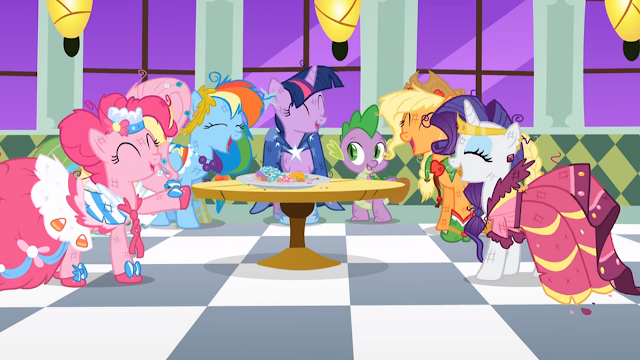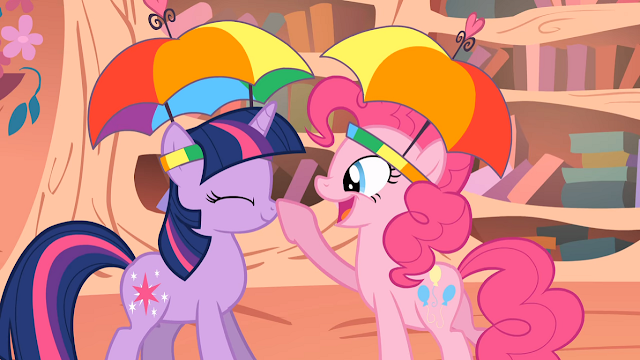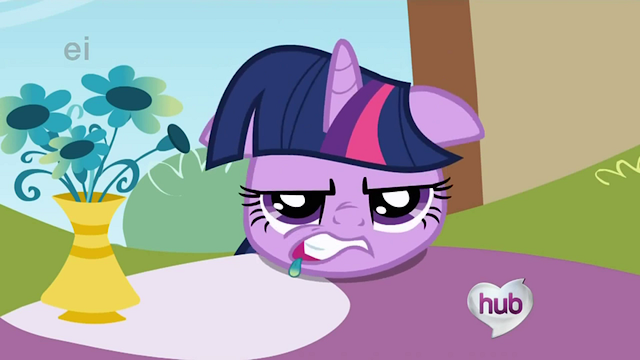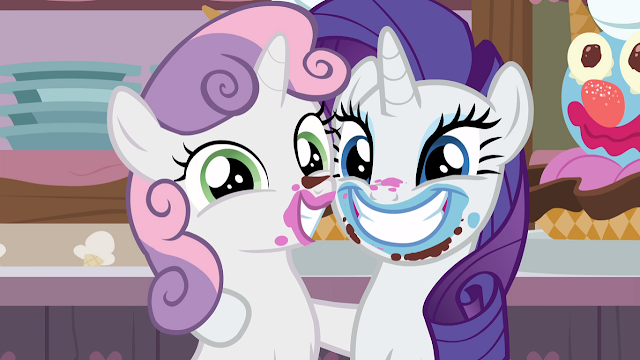Change, in some form or another, is almost inevitable for any TV show that lasts a while. Friendship is Magic, now in the middle of its eighth season, is no exception. This show's changed a lot since it first trotted onto the small screen back in 2010. Wings have been slapped onto ponies, treebraries have been blown to smithereens, and once-evil ponies have been learned the magic of friendship and become a member of the main cast.
But those big events that make the fandom implode aren't the only things that've changed over the years. There are plenty of things in FiM that have been altered and haven't been discussed to death, brought back to life, kicked in the shins, burned, tarred and feathered, thrown into a nuclear testing range, and finally launched into low Earth orbit in a rocket with the words "do not open, dead horse beaten to a pulp inside" scrawled on the door.
You know, the stuff that isn't related to Larson sticking a pair of wings onto Twilight or Glim Glam joining the show. The parts that didn't make people go into a frenzy when they were changed
And what better time to briefly look at why and how those parts of the show (and the parts in low Earth orbit) changed over the years than when the mid-season hiatus is driving us all insane?
If you've ever rewatched the first season, one of the first things you probably noticed was how simple the show used to be. Most of the original twenty-six episodes are just about everyday life for Twilight Sparkle and her friends, with an adventure or monster thrown in every so often to spice things up. Even the narrative arc is about a slice-of-life event. After all, the Grand Galloping Gala is just a fancy party.
Applejack's entire reason for being here was to earn enough money to replace the roof for the barn, buy a new plow, and get Granny Smith a hip replacement surgery. She earned exactly two bits.
Really, the season's about as odd as a shark driving a golf cart when you compare it to the rest of the show. It's the only season to not have a two-parter finale, the only one with a focus on jokes or gags instead of the story, and the only one with Benny Hill chase scenes.
It's also very obviously aimed at pre-teens. Almost none of the stories deal with things that a six-year-old couldn't easily understand, and they avoid mature themes or ideas. The characters rarely leave Ponyville, the reset button is almost always used, and Twilight always tells us the moral through her friendship reports at the end of every episode. There are exceptions to this (Feeling Pinkie Keen and Over A Barrel), but for the most part the show was a very simplistic program when it started.
This may look cute, but talking about this episode was a good way to open a huge can of worms back in the day.
I believe there are two reasons for this simplicity. The first reason is that the show followed the Educational and Informational requirements. The requirements are difficult to find online and are often determined on a case-by-case basis by the FCC, but we do know that they tend to limit what references and plots you can use in a show.
And if you want to know how limiting it was, here's Lauren Faust talking about working with the E/I requirements from a 2011 interview:
...there was also worry about seeming mean - and I don't mean cruel or dastardly, I mean slightly rude or mildly insulting... character behavior that was considered OK in shows I'd worked on previously was suddenly considered "inappropriate for children" in My Little Pony. Something as mild as Rainbow Dash calling Twilight an "egghead" in Fall Weather Friends was treading a very delicate line. Even the whole concept of her and Applejack cheating was worrisome to some. It was tough to find humor and create character conflict within these very constricting boundaries.
The frustration's worth it for that sweet, sweet watermark in the upper left-hand corner.
Which leads us to the earliest change in the show: ditching the E/I requirements. It's subtle, but you can tell there's a difference in how the show's written between the first and second season.
As an example, I'm fairly certain that A Canterlot Wedding never would have been made if the show had continued to follow those guidelines. Can you imagine people who got worried over Applejack and Rainbow Dash cheating in a race being okay with Chrysalis?
In addition to Chrysalis, the second season is also where some more mature themes, morals, and ideas start to show up. Dragon Quest in particular stands out with the moral "who you are is not the same as what you are."
Another episode worth mentioning here is A Friend in Deed, which brings up the idea that you can't be friends with everybody, but ends with the message that some friends just like to be left alone.
This whole interaction is quite possibly the worst first impression Pinkie could have given poor old Cranky.
From that point on, the show's dealt with more mature ideas, morals, or themes every season. The most recent example that comes to my mind would be Surf and/or Turf, which can easily be interpreted as an allegory for divorce and how it affects a child.
And ever since season five, the show's had a tendency to combine those ideas with some really dark concepts. For example, Bloom and Gloom is about Apple Bloom having an existential nightmare about growing up. This includes being scared of getting a talent that nopony would want, fearing that her friends will leave her behind, and thinking that her family will disown her if she turns out to be good at something that doesn't involve the family business.
It also uses visuals right out of Evil Dead II (warning: video contains violence).
This practice of using mature themes, ideas, morals, etc. leads us to the second reason why season one was so simple: Season one was aimed at a fleeting demographic. That is, it was designed so that little Suzie would love the show when she was six, but outgrow it when she was twelve.
A lot of children's shows do this, such as Daniel Tiger's Neighborhood and, to a lesser degree, Spongebob Squarepants. It's why sixty-five episodes were seen as enough for a kids' show to go into syndication back in the 1980s. A lot of folks thought kids wouldn't stick with a show for longer than three years, so what was the point of permanently changing things or developing the characters?
Now, the syndication idea hasn't been relevant since 2007, but it's still pretty common to see a show aiming for that fleeting demographic. And as I said earlier, Friendship is Magic started out as one.
Somewhere along the line, right around the sixty-fith episode mark, this changed.
Looking back, it's actually rather interesting to see just how much of the show had to change as a result of Twilicorn. The Cutie Map, Twilight's castle, the Student Six, the Friendship School, Starlight Glimmer, a bigger focus on continuity, it all leads back to Twilight getting wings.
But what's really interesting, to me at least, is that Twilicorn gave the show an opportunity to grow with its audience.
As you might have guessed, there's a small problem with shows that aim for a fleeting demographic: When the audience outgrows the show, they stop watching it. Sure, there are plenty of younger kids to take their place, but eventually you'll end up repeating the same stories over and over again so that the replacements can get invested in the show.
This leads to stagnation, which leads to fewer people watching, which leads to cancellation or a long, sad life of bad-to-mediocre seasons. It's kind of like Canterlot Boutique, minus the happy ending.
Unlike shows that target a fleeting demographic, shows that grow with the audience do exactly that: they grow more mature as the audience grows up. A good example of this is Adventure Time. That show's gone from gross-out comedy to serious narrative arcs and depressing backstories. Heck, it's even killed off a few characters.
Friendship is Magic has followed this principle since the end of season three. It's why the later seasons have episodes about a megalomaniacal dictator forcing everyone to be equal, addiction, mending old friendships, inferiority complexes, etc.
In addition to allowing for more mature themes and ideas, growing with the audience has let the show evolve in the storytelling department. For a long time, every episode ended with a moral being delivered via a monologue at the end. Lately, however, the show's been using dialogue to imply the morals rather than outright state them.
Forever Filly is a great example of this. The moral is never explicitly spelled out via narration. Instead, it's indirectly given to the audience through a conversation between Sweetie Belle and Zipporwhill toward the end of the episode:
And to be quite honest, that moral's probably better suited for the parents than the kids.
Like I said earlier, this show's changed a lot over the years. Personally, I think it's been for the better. Friendship is Magic has gone from a simple kids' show about some ponies living in a town to a family program about a constantly changing, vast world and the growing characters that live within it. For me, it's been so very fascinating to watch that transformation. I hope you've found it just as interesting to read about.
Thank you for reading.
A lot of children's shows do this, such as Daniel Tiger's Neighborhood and, to a lesser degree, Spongebob Squarepants. It's why sixty-five episodes were seen as enough for a kids' show to go into syndication back in the 1980s. A lot of folks thought kids wouldn't stick with a show for longer than three years, so what was the point of permanently changing things or developing the characters?
Now, the syndication idea hasn't been relevant since 2007, but it's still pretty common to see a show aiming for that fleeting demographic. And as I said earlier, Friendship is Magic started out as one.
Somewhere along the line, right around the sixty-fith episode mark, this changed.
You can't escape this image whenever you talk about change in the show. It'll find a way into whatever you're writing when you aren't looking.
Looking back, it's actually rather interesting to see just how much of the show had to change as a result of Twilicorn. The Cutie Map, Twilight's castle, the Student Six, the Friendship School, Starlight Glimmer, a bigger focus on continuity, it all leads back to Twilight getting wings.
But what's really interesting, to me at least, is that Twilicorn gave the show an opportunity to grow with its audience.
As you might have guessed, there's a small problem with shows that aim for a fleeting demographic: When the audience outgrows the show, they stop watching it. Sure, there are plenty of younger kids to take their place, but eventually you'll end up repeating the same stories over and over again so that the replacements can get invested in the show.
This leads to stagnation, which leads to fewer people watching, which leads to cancellation or a long, sad life of bad-to-mediocre seasons. It's kind of like Canterlot Boutique, minus the happy ending.
Honestly, this episode is depressingly realistic up until the last few minutes.
Unlike shows that target a fleeting demographic, shows that grow with the audience do exactly that: they grow more mature as the audience grows up. A good example of this is Adventure Time. That show's gone from gross-out comedy to serious narrative arcs and depressing backstories. Heck, it's even killed off a few characters.
Friendship is Magic has followed this principle since the end of season three. It's why the later seasons have episodes about a megalomaniacal dictator forcing everyone to be equal, addiction, mending old friendships, inferiority complexes, etc.
In addition to allowing for more mature themes and ideas, growing with the audience has let the show evolve in the storytelling department. For a long time, every episode ended with a moral being delivered via a monologue at the end. Lately, however, the show's been using dialogue to imply the morals rather than outright state them.
Forever Filly is a great example of this. The moral is never explicitly spelled out via narration. Instead, it's indirectly given to the audience through a conversation between Sweetie Belle and Zipporwhill toward the end of the episode:
Sweetie Belle: I understand. But doing things like you used to won't turn him back into a puppy.For what it is, that's a great bit of writing. It lets the target audience, who've probably grown old enough to feel exactly the way Sweetie Belle does in this episode, figure the message out themselves instead of outright telling them.
Zipporwhill: So... What do I do?
Sweetie Belle: Treat him like the dog he is, and find new favorite things to do together.
And to be quite honest, that moral's probably better suited for the parents than the kids.
I've got nothing for this. It's just a cute picture.
Like I said earlier, this show's changed a lot over the years. Personally, I think it's been for the better. Friendship is Magic has gone from a simple kids' show about some ponies living in a town to a family program about a constantly changing, vast world and the growing characters that live within it. For me, it's been so very fascinating to watch that transformation. I hope you've found it just as interesting to read about.
Thank you for reading.
algernon97 is worst pony.










































